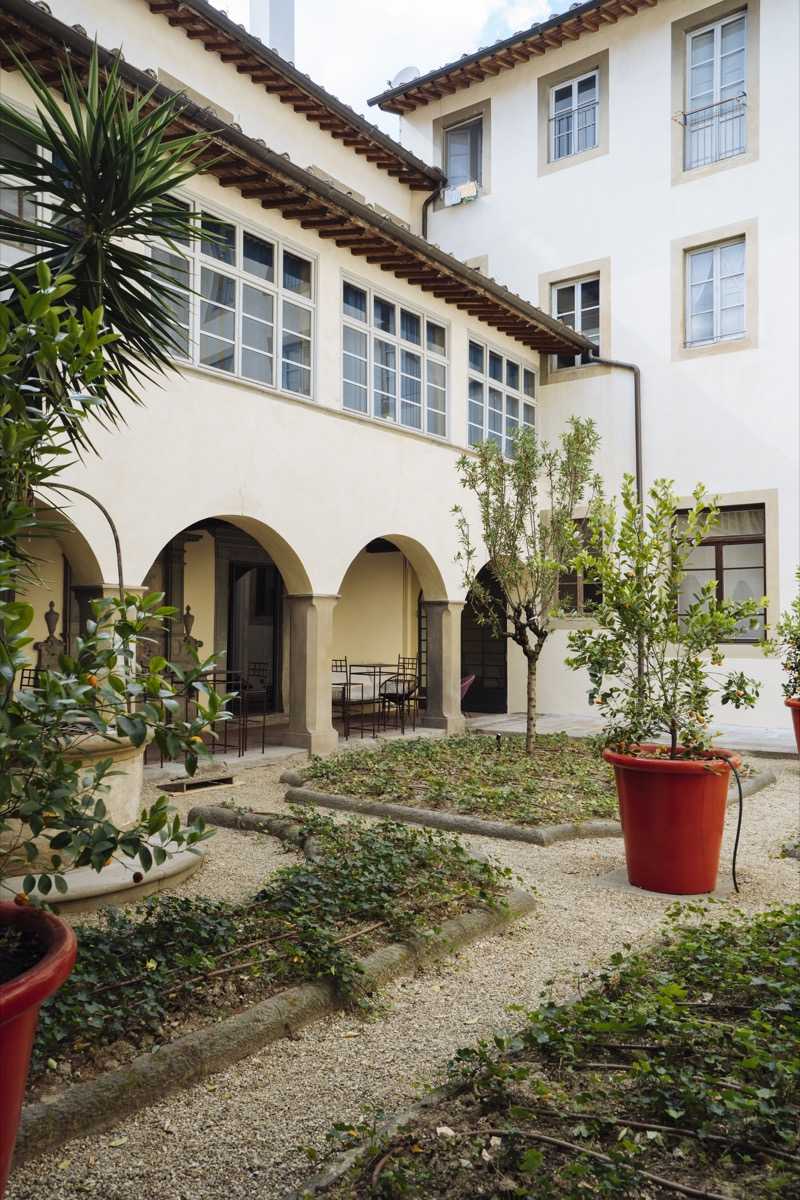FLORENCE, Italy – The new “caffetteria” by Ditta Artigianale and Hario Cafe opened up in Florence in the former monastery of Sant’Ambrogio. The café is the first of its kind to host a Coffee School, an international academy dedicated to the diffusion of specialty coffee culture, asides from also being a permanent educational spot and a meeting place for each and every coffee lover. After not being used for 35 years and a complex restoration process which lasted 4 years, the former monastery of Sant’Ambrogio, in the heart of the city roars back to life.
The restoration project of the medieval compound located in via Carducci (2-4) was done in collaboration with Comune di Firenze and with the support of ASP Montedomini, owner of the spaces. ‘Ditta Artigianale Carducci’ is the third store in Florence – after via De Neri which opened in 2014 and via dello Sprone in 2016.
The group is founded by Francesco Sanapo and Patrick Hoffer, the first line of specialty coffee stores in Italy and a microroaster dedicated to conscious consumption and a responsible supply chain. Every store has a common soul with a unique personality which goes beyond the idea of a commercial chain.
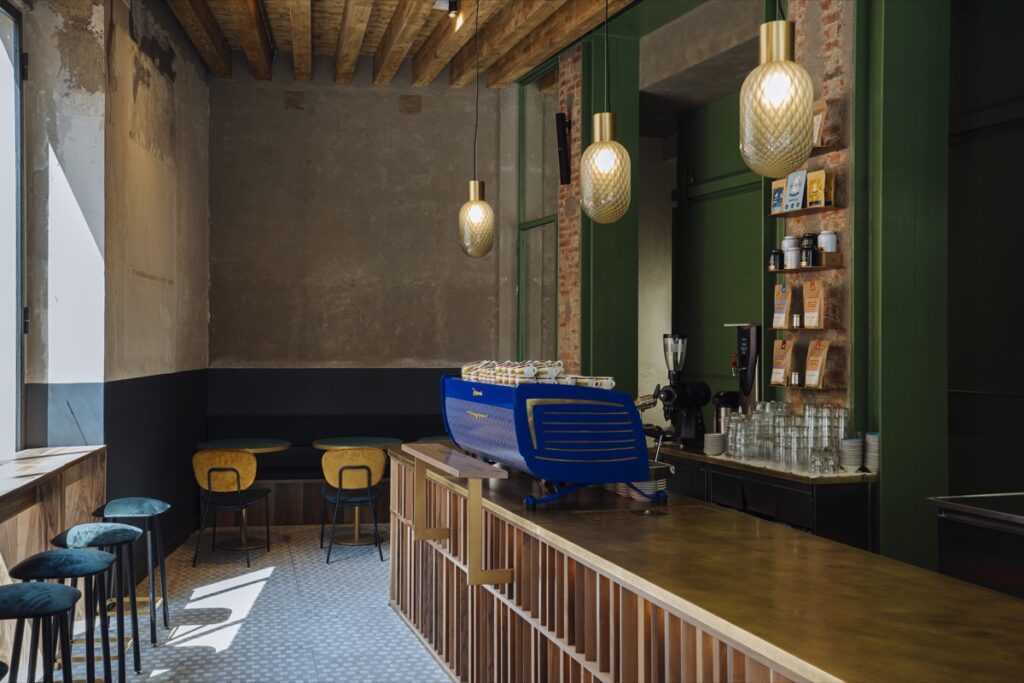
Technical partners of the Coffee School, which will begin its classes next September will be key players in developing its success. Hario, the Japan-based world famous brewery tools company known all over the world for the beauty of its shapes as well as the precision and functionality of its tools and equipment for alternative coffee extractions. Simonelli Group, known as international level experts in the creation of coffee machines, especially its beautiful espresso machines. Local partners include Caffè Corsini, a worldwide ambassador of quality coffee roasted in Tuscany as well as Confcommercio Firenze.
The historic classic Tuscan spaces fuse with contemporary interiors creating an international atmosphere. This was the main focus of the renovation project for the 300 sq. m. designed by Studio Q-bic, founded by the architects Luca and Marco Baldini. Landscape architect Nicolò Mori will has given new luster to the cloister, maintaining the typical monastic garden structure but introducing new plants such as bergamot and almond trees. Maura Masini also restored the ancient well, the fountain as well as all other serena stone elements present in the complex.
The Scuola del Caffè is in the former refectory, overlooking the cloister, whilst the premises overlooking Via Carducci is the heart of the café. The school, born from the necessity of creating an international meeting place for the coffee industry, aims to become a reference point for baristas, roasters, tasters and “coffee lover” enthusiasts. Its primary aim is to educate with respect to sustainability, innovation and expertise within the complex world of coffee.
The staff is extremely well versed on cutting edge technology as well as contemporary techniques to roast, brew and taste the precious resource. The Director of the school is Simone Amenini who will teach alongside Italian Barista Champion Francesco Masciullo. The school will host a variety of classes, a CQI – Coffee Quality Institute and SCA Specialty Coffee Association certificated lab, a room for events and a barista shop where to buy specialized tools. Graduates will be eligible for educational internships with third wave coffee companies as well as scholarships for SCA certified courses.
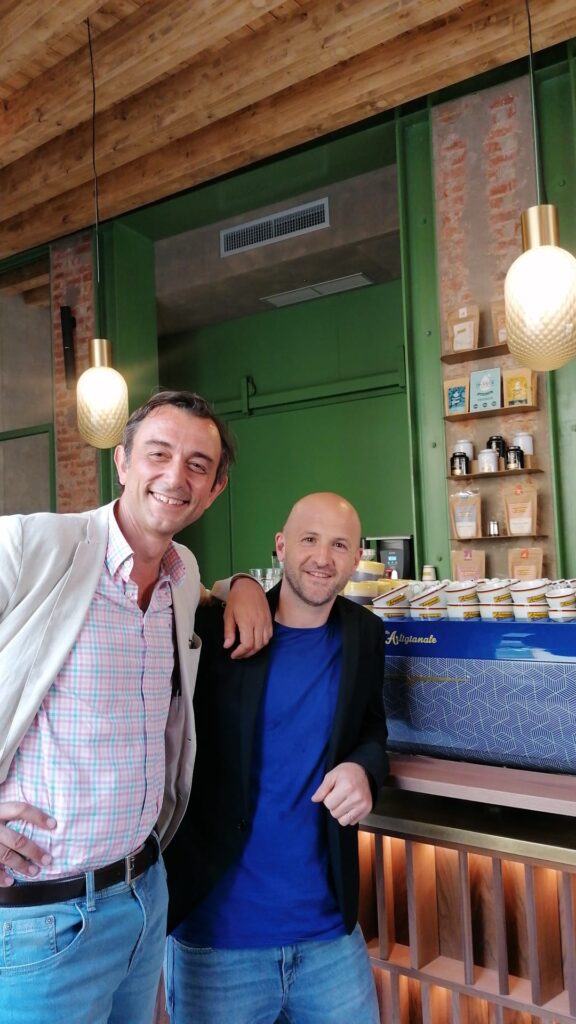
‘I put my soul in this place, four years of my life. But it was worth it: it’s the most beautiful cafe in Europe for me – declares Patrick Hoffer, visibly thrilled – we fought with unforeseen problems and covid related slowdowns, we faced many hard moments, like when we found out that we had to re-do all of the slabs, but we never gave up and Carducci fully rewarded us. In this place there are many stories running around, there are many little details that were brought back to life and are now visible, exceptional and breathtaking corners, like the old decorative frieze in the middle of an arc that we restored in the former refectory, the niches, the old cellars where monks used to keep food. Ditta Artigianale Carducci is a 14th century spot in a 19th century area of the city, a wonderful mix of styles and ages. I’m happy about this renovation which brings back a timeless flavor, respectful of the history of this place.’
‘I believe that this is a new page for the history of coffee in Italy. I strongly wanted a Coffee School, an educational place where to bring passion and professional knowledge which distinguishes Ditta not only in the service but also in the training of new baristas – says Francesco Sanapo, former barista champion, cup taster and co-creator of Ditta Artigianale – here at Ditta we believe it’s fundamental to create a new and more professional background for those who stand behind the counter and that it is necessary to move beyond the figure of the barista who works with no real technical knowledge of the product in favor of a new role model capable of guiding the customer into a gustative experience and who is not limited simply to preparing a fast-consumed espresso.
Opening the school in a medieval compound in what I believe to be one of the most beautiful cafes in the world, can only make me proud. We work hard with farmers who grow plantations following the principles of a sustainable development, of the safeguard of the planet and of the maintaining of the top quality of the beans; we respect their work and sacrifice, that’s why we roast our coffee with great care. We study every kind of bean and we regulate the roasting profile in order to increase their flavor and aroma. We train our baristas to teach them not only knowledge, but also passion for a product as precious as our coffee. We want this love to be felt by every customer who steps into our cafes’ he concluded.
‘As always, working in Florence, we love to highlight the history, time and intrinsic value of the buildings themselves. In Carducci we wanted to remove the superstructures as well as the paint layers, to emphasize the time halo – said Luca and Marco Baldini of architect studio Q-bic – the third Ditta Artigianale is, as always, very different from the previous ones; going against the idea of replicating formats, here we also use a different language, because we firmly believe that every venue has a different soul, with which it is necessary to relate to.’
Ditta Artigianale has a complete offering, from breakfast to brunch/lunch. Open every day from 8:30 am until midnight, in Ditta Artigianale Carducci, the coffee service is the main offer due to a menu of flavor-rich specialty coffees selected from small producers around the world and roasted here in Italy. In the opening week it will be possible to enjoy a unique experience in the world of coffee, with the chance to taste three unique coffees specifically chosen for the occasion from the Colombian farm, Immaculada, of the Holguin family: ‘Sudan Rume Natural’, ‘Laurina Natural’ and ‘Geisha’.
Coffee is freshly served via different methods: from espresso to V60, Syphon, Aeropress, Cold Brew as well as the Steampunk, which introduces a new technique, not very common but extremely versatile.
In terms of food, the offer will revolve around classics of the Ditta kitchen (from excellent fresh pastry to American brunch-style favorites such as pancakes, scrambled eggs, croque monsieur and croque madame, bagels and of course the Firenze Cadillac Club Sandwich). Ditta’s food caters to the season and currently features a delicious, chilled cream of corn soup with lime and cilantro. All products are sourced fresh and locally.
The cocktail bar is curated by bartenders who reinterpret classic drinks with a modern flair. An important part of Ditta’s offer is still the Gin Bar, with a selection of over 150 different labels coming from all over the world, served with different snacks during aperitivo. Of particular interest is ‘Peter in Florence’ gin, the first Italian artisanal gin to be produced in a gin-oriented distillery overlooking the hills of Pelago at Podere Castellare. Created by the same founders of Ditta Artigianale in collaboration with Patrizio Pandolfi, many of the botanicals found in the gin are gown on the property including the bright juniper berry. Among the cocktails on the list are excellent pre-made Peter in Florence cocktails such as the Martini, Negroni and Martinez. The menu will also include Ditta’s signature coffee drinks such as Coffeemisù (an espresso based beverage with crumbled biscuit, a premix of milk and mascarpone and chocolate powder) as well as the Cold Brew Affogato (cold brew infused with cinnamon, fior di latte ice cream and a dusting of cinnamon on top).
Ditta Artigianale: The Restoration Project
The new Ditta Artigianale and Scuola del Caffè will open in a unique place: inside a former medieval monastery, decorated with contemporary furniture and materials which will give it an international look and feel. The project is the work of Studio Q-bic, founded and directed by brothers Marco and Luca Baldini, who are also responsible for the other two Ditta Artigianale cafés in Florence (located on Via de’ Neri and Via dello Sprone). Clean lines, neutral tones, exposed wood, cement and steel beams all come together to create very unique spaces. In the Carducci location, the walls, cleaned from their former paint, will once again look as they used to in ancient times. A centerpiece of the café is the custom-made coffee bar and pastry case which invites customers to mingle with the baristas and bartenders as they prepare beverages. The old refectory, overlooking the cloister, has been transformed in the School, with a big central counter, as well as a collaborative learning space with state-of-the-art equipment.
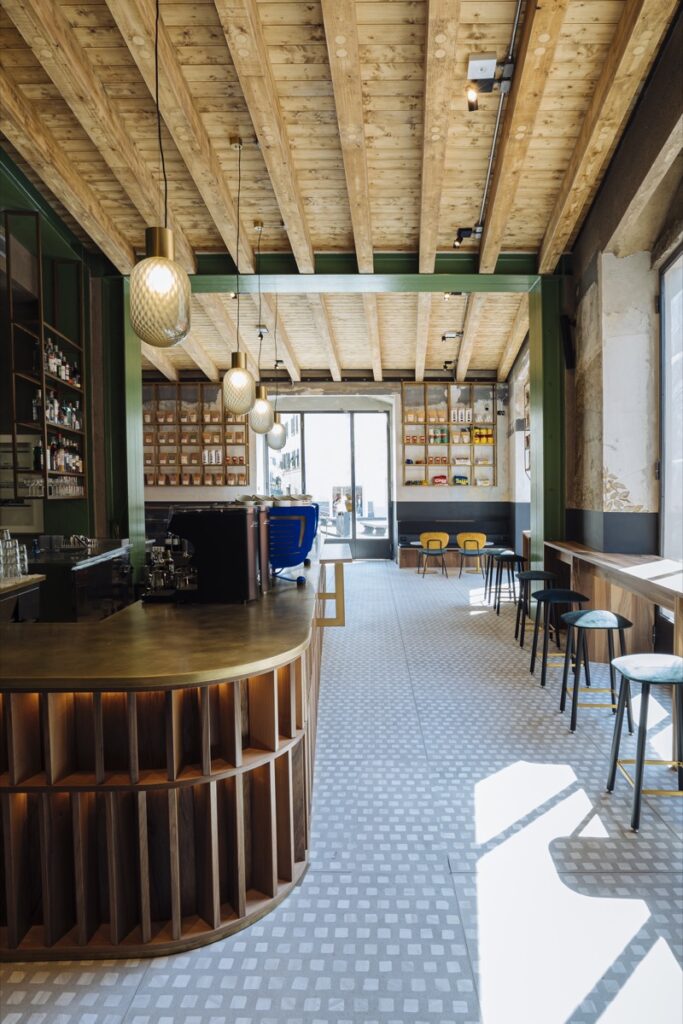
The outdoor cloister area has also been restored, thanks to landscape architect Niccolò Mori. The cloister maintains its original planimetry which consists of typical monastic garden features, characterized by ornamental and productive plants such as almond trees, bergamot trees and ivy. The classic subdivision into four quarters remains as does the ancient well which is still functional and actually irrigates the plants in the garden itself. The gravel in the different paths has been substituted with river gravel which is much more in line with a classical Tuscan garden.
Restorer Maura Masini has worked on the fountain, the well, the frescoes, and all the sandstone elements.
The Coffee School
The main aim of the Scuola del Caffè is educational: to inform the public, coffee enthusiasts and coffee field experts of what lies behind a cup of coffee. From the work on the farms, to the roasting all the way down to the brewing on the counter, there is a world made of research, innovation and attention to both human and environmental sustainability that needs to be described and appreciated.
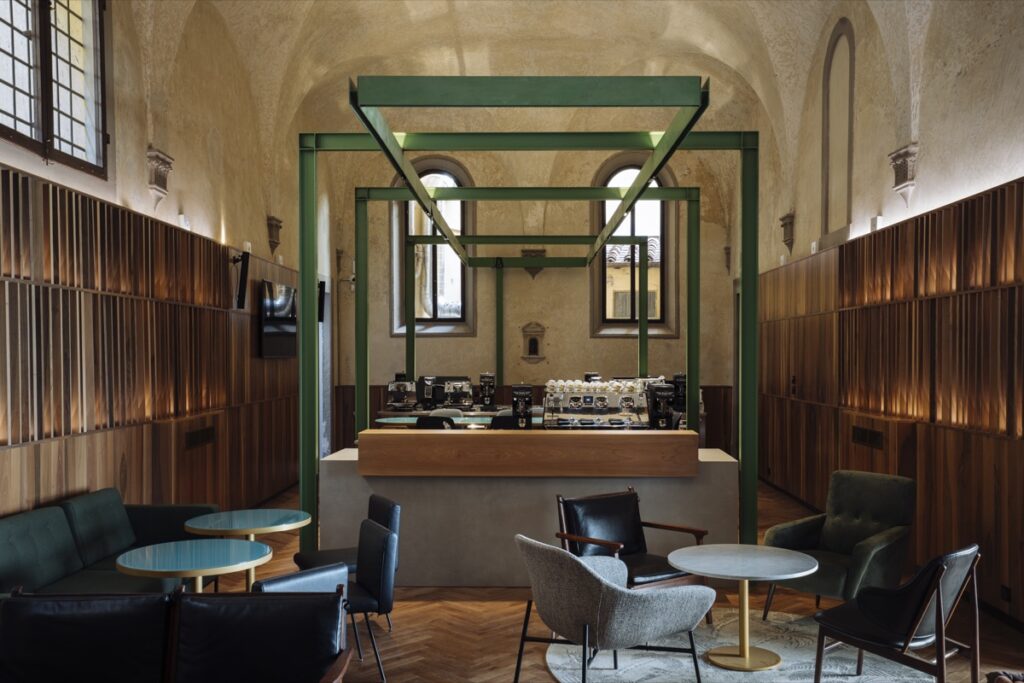
The school aims to form coffee field experts fully knowledgeable on the provenance of coffee, on the different taste nuances, and on the various extraction methods. It will also emphasize the importance of professionality in the hospitality world thanks to the collaboration of world leading companies from the coffee field such as HARIO, to hotel schools, and vocational schools such as the Youth Academy of Simonelli Group with which SCA-certified vocational courses will be taught. The goal is not only to form great baristas, but also roasters, tasters and even entrepreneurs interested in learning how to open a specialty coffee start up, a micro-roastery or a coffee bar. Faculty are some of the major experts from the field and world-renowned tasters such as Francesco Sanapo, Francesco Masciullo, Simone Amenini, Michele Anedotti, to name but a few.
History of the Monastery: From a community for prostitutes to a laboratory for the restoration of books
The former monastery complex, also known as “the complex of the Pious Shelter Home of Sant’Ambrogio”, has very old origins, being closely linked to the Sant’Ambrogio complex built during the V or VI century AC. At the end of the XVIII century, the monastery, impoverished after the Leopoldine reforms, become a secular institution for the education of young women. Following the French regulations of 1808, the boarding school was suppressed and the whole monastery re-allocated to public housing. However, in 1815 the rights on the property passed to the Dominican nuns of the Pietà in Via Giusti.
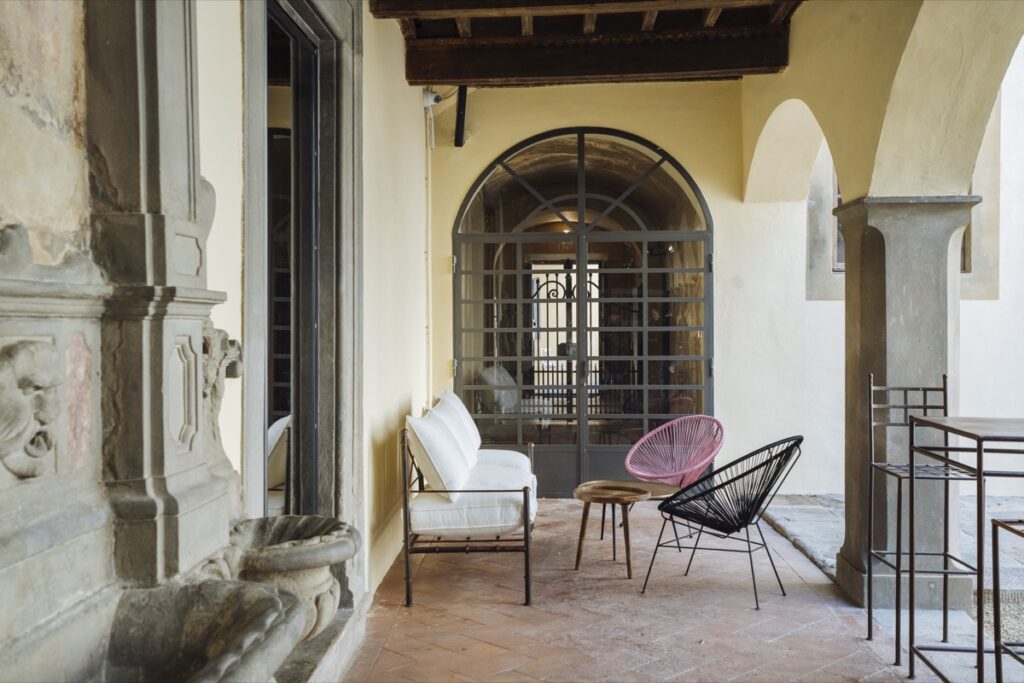
The following year, the administration of ecclesiastical properties gave the premises to a secular community of prostitutes “looking for redemption”. In 1835, the Pious Home was transformed into a moral institution that continued to be involved with the rehabilitation of young women, enjoying a long period of economical affluence interrupted only during WWI when the building was requisitioned for military purposes. Following this, part of the property was sold to the Society of Infants Schools and subsequently demolished during the urbanistic renovations of the area according to the city’s regulatory plan drawn up by Luigi Del Sarto.
The 1966 flood caused serious damages to the whole building which exposed various structural flaws. In 1976, the Pious Institutions passed under the administration of the Comune and in 1979 the extra rooms were rented out to the National Library. In 1991, the Ministero dei Beni Culturali (Ministry of Culture) bought the majority of the former monastery to house the laboratories for the restauration of books. Lastly, in 2010, the whole complex was passed over to the Azienda di Servizi alla Persona Firenze Montedomini. [Source: Francesca Carrara, Ludovica Sebregondi, Pia Casa Rifugio di Sant’Ambrogio].
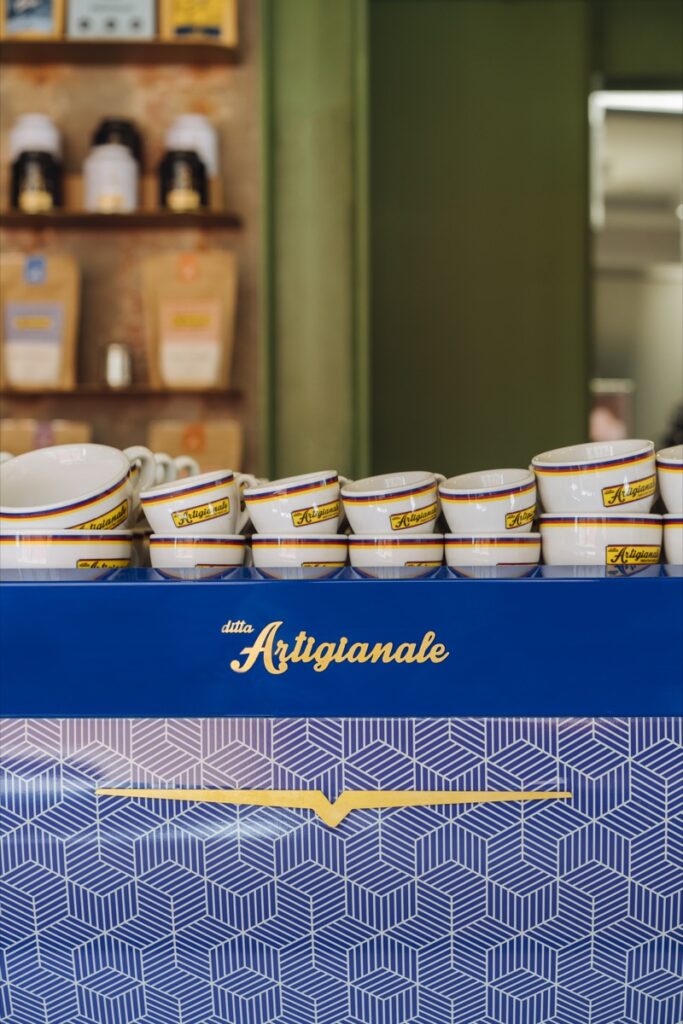
About Ditta Artigianale
The first Ditta Artigianale, born in 2014 on via dei Neri 32r is a venue with a modern and vaguely industrial style, typical of New York specialty cafes; the second store is located in via dello Sprone 5r, rising on the famous rive gauche of Florence also known as Oltrarno and just a few steps away from Ponte Vecchio in a building designed in the 1950s by Giovanni Michelucci, one of the most important Italian architects of the 20th century. The store operates two floors with different styles and is a venue with elegant tones as well as a refined ’50s-’60s aesthetic where wood, marble and concrete – typical of the afterwar – are dominant, as inspired by the rationalist architecture of Michelucci himself.
Ditta Artigianale is Italy’s original specialty coffee company (dedicated to high quality coffees with particular tasting merits), directed by world renowned barista champion Francesco Sanapo who personally visits and selects the best beans in various countries of origin around the world. Ditta Artigianale is also a micro-roaster and its coffees, roasted and freshly served, may be purchased form www.dittaartigianale.it.



